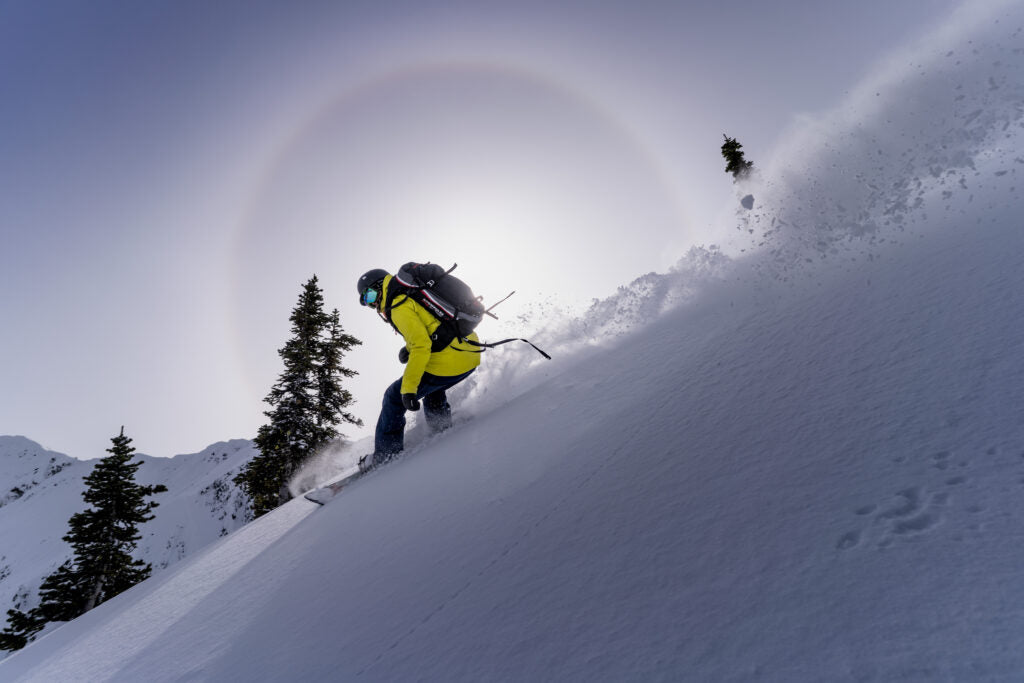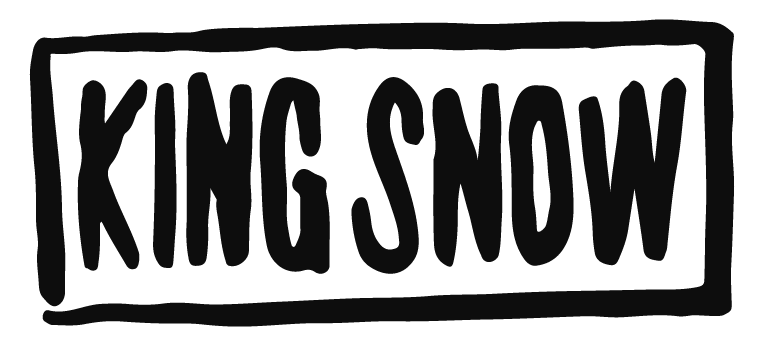COMMUNITY CONNECTED | SANDY WARD
By Matt Coté
From the start of the day she’s out front. Her board split in two, she skins uphill leading a group of BIPOC women along the flanks of Revelstoke, BC’s Mount MacPherson. For many of those behind her, this is their first foray into the backcountry, and 36-year-old Sandy Ward’s quiet confidence is laying both a literal and figurative track to follow.
As both a competitive halfpipe rider and wide-eyed adventurer, Ward has traveled the world and left her mark on all four corners. These days, though, she’s shifted her focus from contest results to making it easier for other underrepresented people to reach the same heights she has.
Some of that comes from simply holding court within snowboarding as an Indigenous woman, and some of it comes from direct efforts to pry open more space for others. Working with groups like Indigenous Women Outdoors and Indigenous Life Sport Academy, Ward has emerged at the forefront of the movement to get First Nations people back onto their traditional territories through snow.

“I got my first job in Whistler Village when I was 15,” she says, reminiscing about commuting on weekends from her home in nearby Mount Currie, which is part of the Lil’wat Nation. Ward grew up only a stone’s throw from one of the biggest snowboarding scenes on Earth, but, culturally, it was a world apart. When she eventually found someone to take her out, she broke her wrist that first morning, but still spent the whole day on the mountain. She was in love, and snowboarding soon became a part of her.
“I’m known in my nation for it,” she says. “A lot of people don't even know my name. They call me the snowboarder.”
Still, it was tough to make inroads. She didn’t know any other Indigenous riders, and though there was a snowboard team at her high school, it was all white dudes.
Then, in 2005, someone from her community recommended her to the newly founded First Nations Snowboard Team (FNST), which was trying to get an Indigenous person to the 2010 Olympics. She was invited to join, and from there graduated to the BC Provincial Freestyle Team, where she focused on halfpipe. She spent four years chasing podiums, and getting awfully close, before injuries started stacking up—like a thrice-torn left ACL. At the age of 25 she gave it up, and decided to travel the globe in search of powder instead. After spending a season in Chamonix, France, a new world opened.
“I had only really been riding resort, in the parks and stuff,” she remembers. “So I had no idea about, you know, avalanches and backcountry safety. Or even that in France, if you duck under a rope, that's considered the backcountry.”
She came back to Canada, bought a splitboard, started taking avalanche courses, and threw herself back into a job as an instructor at Whistler Blackcomb (she’d been coaching and instructing since she was 19). That’s where she met Mikey Barton, a Nisga’a snowboarder from Northern BC.
“I was like, wait, is that another Indigenous snowboarder?” Barton recalls. “It was just the two of us.”

Barton would eventually go on to become one of the head coaches with Indigenous Life Sport Academy (ILSA), which ultimately absorbed the FNST where Ward got her start. The two struck up a friendship, and had similar visions for First Nations folks in snowboarding. But what struck Barton most was how much Ward had accomplished on her own, and what a leader that already made her. She’d done seasons in Japan, New Zealand and Australia, and had earned wide respect for the skills she learned and the time she put in. She was known as a force.
“Being well-recognized in the community, not just for being Indigenous, but for being good and successful [is really powerful],” Barton says, who was in awe of how well she could read terrain and flow with it. But also that she didn’t take no for an answer.
For Ward, though, it didn’t always feel so bold. She says her Indigenous identity had to take a backseat to the subculture of snowboarding in order to get by, and it was never an easy fit.
“It didn't feel like the place where I could express myself and my culture,” she explains. “I never felt like a part of the larger snowboard community. Like, even after being in films like Fabric, it still feels very foreign to me.”
Still, she carried forward, hoping it could be different for future generations.
“I think it's really important that the youth have leaders like themselves to look up to. That's one thing I didn't have when I was a kid. Or even when I was competing. Like, at the level I was at, I was the only one. And it often felt like I didn't belong.”
Then, a few years ago, she met Myia Antone from the Squamish Nation, who’d been working through a similar dearth of opportunities to get into the backcountry. Together they started Indigenous Women Outdoors, to create a bridge behind them.
“That's why Myia wanted to start it,” Ward says, “she wanted to learn more and find more like-minded Indigneous people to get out on the land with.”
Only a couple years later, both ladies are blazing an ever-longer trail. As the group of women they’ve brought from the Coast to Revelstoke strap in at the top of their run, some too nervous to speak, it’s Ward who goes first, laying a safe and comfortable line for them to flourish or fall down beside.
The cultural safety net the organization provides, more than anything, has made it swell in size. Both Antone and Ward have been overwhelmed by participants and media. In the wake of that, Ward says she’s seen snowboard culture start to welcome Indigeneity in a way she hasn’t before.
“It was definitely a lot of work to open up that space, especially within the industry itself. Like, we've always had the [FNST], we've always had our own little community, but we haven't been included within the wider industry. And now that's changing.”
Today, Ward teaches skills clinics through Extremely Canadian, volunteers with ILSA, and runs programming for IWO; including Avalanche Safety Training courses. But her ultimate goal is to become a backcountry guide, and blaze that trail for Indigenous women next.
Whistler sits within the unceded traditional territories of the Lil’wat and Squamish Nations. Revelstoke sits within the unceded traditional territories of the Sinixt, Ktunaxa, Secwépemc and Syilx Nations.
